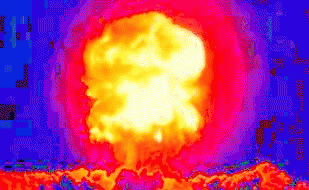Pakistan is suddenly the epicentre of a lot of things, mostly bad. And now comes news that it is set to overtake France to become the world's fourth largest nuclear weapons power. This is sending everyone into a collective swoon.
But frankly, Pakistan's nukes are really deja vu all over again. There's no need to lose sleep over them. Here's why.
The Federation of American Scientists estimates Pakistan's arsenal at 90 to 110 atomic bombs. The French stockpile is estimated at 300 nukes and Pakistan is said to be adding between 8 and 20 weapons per year. Assuming the higher figure is true, and also assuming that the French will not build more nukes, Pakistan will become the world's fourth largest nuclear power by around 2021.
Now is that such a big deal? Perhaps to the Pakistanis it is. The dirt poor country, which survives on annual American handouts, has reportedly built a fourth nuclear weapons plant, which is amazing for a country that boasts little industrial or technological skills.
Indeed, for most Pakistanis their nuclear scientists are heroes who restored parity with favourite enemy India and finally entered Pakistan's name in some Top-10 list even if it's the doomsday list.
But anyone who thinks nuclear weapons bestow a macho image in the comity of nation is living under a rock. Nuclear weapons as a symbol of national virility went out of fashion with the arrival of Pakistan. Once Pakistan became a member of the N-club, it became uncool to be a nuclear power.
The Soviet Union possessed over 40,000 nuclear bombs while the US cranked out 28,000 by 1991. The Soviets could have levelled every population cluster in the US and Western Europe with 1000 precisely targeted bombs, but the fact that they built 40 times as many was because of the arms race. They never knew they had enough megatons. Incredibly, the Soviets had amassed fissile material to build another 40,000 nukes.
However, that terrifying stockpile did not help the Soviet Union. On the contrary, precious resources of the world's largest country were wasted in this race. No doubt the Cold War impacted the US as well, and its decline as a major industrial power is a direct result of that wasteful build-up. But it was the Soviet economy, being much smaller than the American, which was more severely impacted.
A similar fate awaits Pakistan. The Pakistanis, their former Prime Minister Z.A. Bhutto said in the 1970's, "will eat grass" but match India's nuclear weapons. The truth is, if the country's American patron hadn't been generous to the tune of billions of dollars, Pakistanis would have eaten grass a long time ago.
Many strategic experts say Pakistan might use the weapons in a war with India. Well, nuclear weapons are not like, say, chemical weapons that have often been used by rogue nations. Crossing the nuclear threshold is so fateful a decision that American and Russian leaders have pulled back from an atomic exchange despite overwhelming pressure to "use them or lose them."
The more likely scenario is that Pakistani nukes could be transferred to Islamic terrorists. That's scary stuff.
But while it is true many Pakistanis would like to see a few Western and Indian cities end up in a nuclear fireball, the reality is they are day dreaming. Simply passing a few nukes under the table to their Talban or al-Qaida terrorist pals won't accomplish much.
That is because atomic weapons are pretty hard to set off. N-bombs have accidentally free-fallen from America and Russian bombers and landed on terra firma without exploding. Nuclear armed submarines have met with horrific accidents without spontaneously launching their deadly loads.
The complex nature of these weapons and their codes may never be mastered by a smelly terrorist or even a freelancing nuclear scientist in a Karachi basement.
Again, Pakistan's weapons are not operationally deployed. Pakistan's 100-odd nukes are kept in central storage under constant watch of American and Indian satellites. If you have wondered why India has a large constellation of spy satellites, know you know.
(Note: You can view every article as one long page if you sign up as an Advocate Member, or higher).





